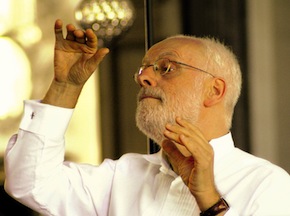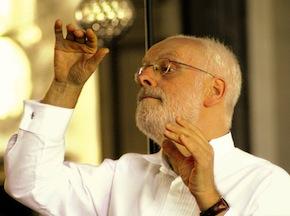
Dutch conductor, organist, and harpsichordist Ton Koopman (b. 1944) is an internationally renowned Baroque music specialist and Bach expert. Koopman (pronounced “COPE-mahn”) studied with Dutch harpsichordist Gustav Leonhardt (1928–2012), a leading figure in the movement to perform early music on period instruments. Like his teacher, Koopman was fascinated by period instruments and a historically correct performance style based on musicological research. At the age of 25, in 1969, he created his first Baroque orchestra. Ten years later Koopman founded the Amsterdam Baroque Orchestra (ABO) and in 1992 the Amsterdam Baroque Choir. With these ensembles, he recorded a complete cycle of Bach’s cantatas, a project that took 10 years. Currently, he is working on recording the complete works of German-Danish composer Dietrich Buxtehude (ca. 1638–1707), who was a major influence on J.S. Bach.
From March 8 to 16, Koopman and the ABO & Choir will be touring the U.S. They will perform Bach’s Mass in B Minor at Zellerbach Hall in Berkeley on March 10.
SFCV caught up with Koopman at home on the night before his departure from the Netherlands (“I still have to pack,” he remarked). Slightly surprised to encounter a fellow countryman, he talked, in Dutch, about the early underground days of historical performance practice in the Netherlands, the importance of continuous musicological research and, of course, J.S. Bach.
Translation by Niels Swinkels
Featured Video
Ton Koopman conducts Bach - Magnificat
Is it fun to go on tour?
Everybody enjoys it. We have had a couple of days of rehearsals and by the end of today I noticed this anxiety; everybody was getting excited and was already thinking of packing and getting ready for the flight. Tomorrow we fly to Chicago. Our first performance is in nearby Urbana; then we go to Berkeley and after that we visit Tucson, Chapel Hill [North Carolina], New York, and New Jersey. Everybody is looking forward to it.
And yourself?
Me too. This is also a good time to read, so I am bringing lots of books. I have a special suitcase just for my books.
Is it commercially beneficial to go on tour?
Touring in itself is usually not very profitable, but the fact that you are on a long tour through the United States is a positive thing; it is good for public relations and for record sales.
You have your own record label, Antoine Marchand, which is a literal translation of your name in French.
When Warner Music decided in 2001 that [record label] Erato was no longer profitable, we were in the middle of our Cantata project, so we had a big problem. I quickly realized that it would be extremely hard to get one of the other big record companies interested, so I decided to go my own way and founded Antoine Marchand. A Dutch record company, Challenge Records, takes care of distribution and logistics, and I am very happy we can work this way. Things have changed a lot in the recording industry. Erato gave me an annual budget, basically to spend as I pleased. Now we can record anything we want without asking anyone’s permission, but we have to find the money ourselves. It is a completely different situation.
During your concerts in the U.S., you will be performing just one work, Bach’s Mass in B Minor. Some people used to think that a Mass belongs in a church and not at a concert venue.
Understandably, there are people, including singers and musicians, who would rather hear a Mass in a beautiful old church than in a concert hall, but you have to be practical. Beautiful old churches don’t usually have the money for a production like this. And of course, when you are performing, you don’t pay attention to the space anymore; you just want it to sound beautiful and enjoy Bach’s brilliant music. And you hope that the audience is educated enough to understand and enjoy the music. But that shouldn’t be a problem in Berkeley.
As a funny aside: We have been invited to perform in Oman with the ABO & Choir, and for me to dedicate the organ that the Sultan of Oman commissioned in Germany. Oddly enough, a program with religious music appears to be a problem there. I don’t know what the reason is, because the Sultan himself plays the organ, the harpsichord, and the lute. Maybe he wants to make sure not to offend anyone. And it is not a problem for us to program secular music.
You also visit the U.S. to work as a guest conductor and a teacher.
Every year, I spend about nine weeks in the U.S., but the last time I was here with the entire orchestra was in 2003 or 2004, when we recorded with Yo-Yo Ma. I spend two weeks as artist in residence with the Cleveland Orchestra, and last November I was in New York to teach at Juilliard’s Baroque program. Last year I was in San Francisco to conduct the San Francisco Symphony. I very much enjoyed working with them.
Can you talk a bit about the differences in history and tradition between the Netherlands and the U.S., when it comes to period music and performances?
Mediocrity doesn’t create a revolution.
The Netherlands has long held a prominent position in the world of period performances, thanks to people like Gustav Leonhardt, who recently passed away, and [conductor and recorder player] Frans Brüggen. Record companies were also very important. Compared with ensembles like the Vienna Philharmonic, recording period instruments was affordable. Also, historic instruments are what I like to call phonogenic; they sound good on a recording. [Record label] Teldec was very successful with the early music series “Das Alte Werk” and they promoted it like crazy. This created a whole new generation of musicians specialized in period instruments: people who were — and still are — internationally active. Meanwhile, in the U.S., San Francisco was the only place with a Baroque orchestra. For a while I was involved with the Portland [Oregon] Baroque Orchestra as artistic adviser, and I soon realized that America has a problem of scale: The oboes would fly in from New York or Boston, the French horns from Chicago or Detroit. It’s a lot of work to get everybody together in one place. [When performing in the Netherlands] if our oboes have to come from Paris, we are talking about a one-hour flight to Amsterdam. This relative proximity made it easier for Baroque orchestras and ensembles to get established in the European music scene.
The Netherlands has long held a prominent position in the world of period performances.
I read in an article that during the early days of historic performance, you would play in small, out-of-the-way venues, dressed in jeans, and everybody had long hair.
That is how it started. It was a real underground culture. We didn’t wear tails — or get haircuts — on purpose. But not always because we were against something; it was just a lot easier this way. And with our period instruments came the absolute conviction that these were the right instruments to perform early music. That created an interesting conflict with the Concertgebouw Orchestra. They said: These period people have great ideas and dreams about music, but they can’t play. And we, in turn, said to them: You can play, but you have no idea how to approach this music. The Concertgebouw Orchestra solved that dilemma by inviting Nikolaus Harnoncourt to conduct. Others, including myself, followed.
Early-music specialists of your generation have really created a permanent change in how to approach early music. No orchestra would play Bach like Mengelberg or Toscanini anymore.
When a composer is alive and shows up at rehearsal, the conductor will say, “Of course, Maestro, we will play it this way or that way. Whatever you want.” But when a composer is dead, it suddenly doesn’t matter anymore. Composers had a very clear opinion about their music and how to perform it, and they lived in a certain time and place. As musicians of the modern era, we have to respect that and try to understand what these composers wanted, through research of manuscripts and other sources.
Of course, we were also very lucky that the people with ideas and dreams about early music and historic performances had plenty of charisma and were capable of teaching others. If mediocre musicians had started this revolution — and I think I can call it a revolution — things would have been very different. Mediocrity doesn’t create a revolution.
It is remarkable, this synthesis and culmination of 40 years of Bach’s genius musicality.
And what are the chances that you are all completely wrong about period performance?
I would have to accept that as a possibility. There is a lot of research material left to explore. All I can say is that I am trying to discover the honest truth. We hope to finish our recordings for the Buxtehude project later this year, and with my students at Leiden University I am constantly looking through old source material for new information, to incorporate in our approach and recordings. Eventually I hope to publish a book about the performance practice of Buxtehude’s music.
If you had unlimited funds, which recording project would you do next?
I would love to record Handel’s complete oratorios. And with more limited funds, but still serious money, I would start with Monteverdi: beautiful music, and I think I would be able to bring a new perspective.
How does the Mass in B Minor fit in Bach’s oeuvre?
The Hohe Messe, as it is also called, is one of Bach’s last compositions and it is the crown on his work. It was completed in 1749, the year before his death, and Bach quotes several of his own previous compositions. He wrote the Kyrie and Gloria as a so-called missa brevis, or “short Mass,” around 1733. He completed this Mass by selecting parts of his own older compositions, only to add a new, sacred text. This is called a parody. It explains, for instance, why you find a piece from Cantata No. 12, Weinen, Klagen, Sorgen, Zagen from 1714 in the Hohe Messe. But not for a single moment do you have the impression that the music originates from a secular cantata or that text and music don’t fit. It is remarkable, this synthesis and culmination of 40 years of Bach’s genius musicality. As a full-length concert piece, it is wonderful. Many different styles and sounds, and the most virtuoso choral music you can imagine: an evening of brilliant music.

